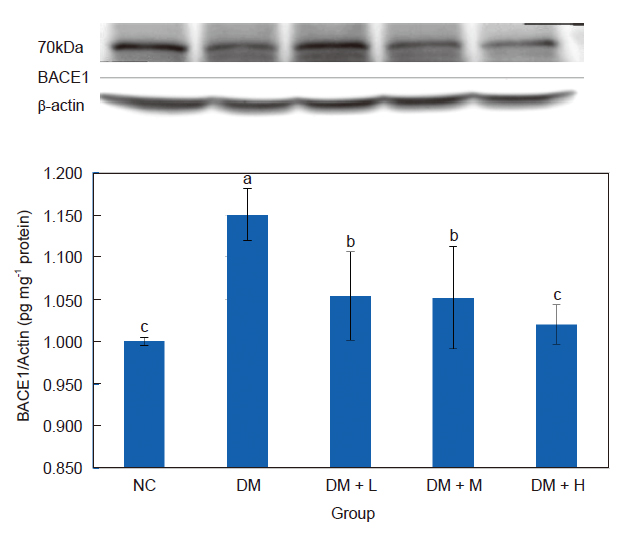All issues

Author:Shu-Hui Yang*, Hui-Ting Yang, and Shu-Chi Chiang
Abstract:
Alzheimer’s disease (AD) is a chronic neurodegenerative disease. In this study, animal model of diabetes induced AD was studied to investigate the effect of Lentinus edodes stipe extracts (LedoStE) on improving the risk factors of AD. Resultss showed that rats fed a high-fat diet and injected lowdose streptozotocin did cause diabetes-like symptoms-eating more, drinking more and weight loss, and also led to increase of AD risk factors. Diabetes mellitus (DM) rats fed with high-dose LedoStE can effectively improve the blood parameter as well as increase insulin secretion and insulin receptor content of brain (P < 0.05), while significantly decreased the levels of AD risk factors sash as amyloid precursor proteins (APP), β-amyloid-42 (Aβ42), β-site amyloid precursor protein cleaving enzyme 1 (BACE1), advanced glycation endproducts (AGEs), and tumor necrosis factor-α (TNF-α) (P < 0.05) in brain. It also significantly increased the time (P < 0.05) to enter the open and central areas of the elevated plus-maze in DM rats taking LedoStE. From the above results, it shows that diabetic animals intake LedoStE can improve the biochemical metabolism of diabetes, which may reduce the risk of Alzheimer’s disease or delay the AD onset.
Key words:Lentinus edodes stipe extracts, Diabetes mellitus, Alzheimer’s disease, Insulin, Elevated plus-maze
Download:![]() PDF Links
PDF Links
- 1. Development of Tractor-Mounted Seedling Transplanter for Sweet Potato
- 2. Synergistic Effect of Additional Gas on the Toxicity of Phosphine to Sitophilus oryzae and Sitophilus zeamais (Coleoptera: Dryophthoridae)
- 3. Effects of Temperature and Solar Radiation on Growth Traits and Plant Elements in Purple Leafy Sweet Potato
 Submit your manuscript
Submit your manuscript
 Guide for authors
Guide for authors